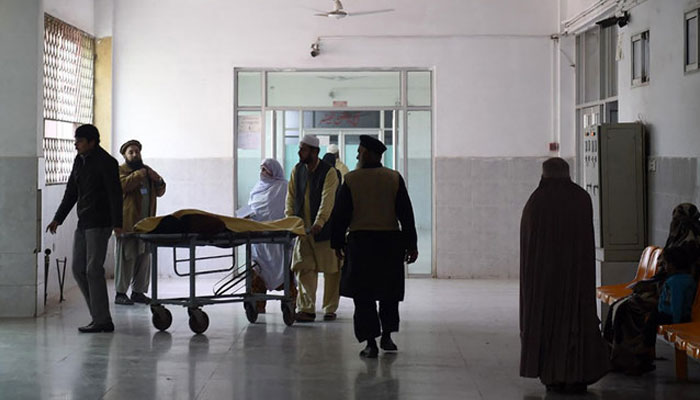Ratio of ischemic stroke increases among diabetics in Ramazan
Rawalpindi : Every year in the holy month of Ramazan, the number of patients reaching the healthcare facilities with the complaints of acute stroke or paralysis registers a significant increase and majority of these patients are those who are suffering from diabetes.
Studies reveal that diabetes mellitus is known to be a risk factor for ischemic stroke and the ratio of ischemic stroke is increased among diabetics while fasting in Ramazan. Health experts say that the diabetics must be careful while fasting to avoid stroke or paralysis. An ischemic stroke occurs when the blood supply to part of the brain is blocked or reduced.
Many experts say that fasting may cause dehydration and the patients suffering from diabetes are more vulnerable to suffer complications as a result of dehydration. Dehydration causes an increase in viscosity of blood, which results in sluggish flow and clot formation. Diabetics have diseased blood vessels and it increases the risk of clot formation. The clot can travel into the brain and block major arteries of the brain that causes paralysis of one side of the body, slurring or loss of speech, visual defects and loss of balance coordination.
Dehydration is when you do not drink enough fluids to replace the ones you lose through breathing, sweating, going to the toilet, etc. Fasting for any period can increase the risk of dehydration. Being dehydrated can affect the flow of blood in your body, increasing the risk of blood clots. Being dehydrated while taking certain blood pressure medications, can also damage your kidneys. Studies have revealed that hyperglycaemia, high blood sugar, during the acute stroke phase is associated with poor outcomes in both ischemic and hemorrhagic strokes.
Experts say that diabetics should be extremely careful while fasting in Ramazan. They should take at least three litres of fluids and water every day to avoid dehydration. They should regularly monitor their blood sugar and blood pressure levels while fasting for a month in Ramazan. The most important thing is regular follow-up with their physicians. It is important that acute ischemic stroke (AIS) or paralysis is a devastating disease that could completely destroy a person’s life. AIS is prevalent in Pakistan and has equal frequency in both genders above 65 years of age.
According to experts, immobility and lack of activity result in sluggish blood flow and higher incidence of stroke among patients and elderly people. The best exercise is to walk everyday for at least 30 minutes. It not only helps in prevention of stroke but also improves blood pressure and sugar levels.
Experts say that it may not be safe for one to continue fasting if he or she is unable to remain hydrated. Drinking enough of the right kinds of fluid before and after the fast is essential. Studies also reveal that during fasting in Ramazan, there is a tendency for the mean fasting blood glucose level to increase. Careless intake of various food items from ‘Iftar’ to ‘Sehr’ is a common practice and this, in combination with reduced physical activity, contributes to the tendency for hyperglycemia. Other possible factors behind increase in blood sugar levels include the decision by patients to reduce or completely stop their medications for the fear of hypoglycemia, the lowering of blood sugar. In Ramazan fasting, the reason for the increase in the rate of ischemic stroke in diabetic patients may be related to hyperglycemia.
-
 Critics Target Palace Narrative After Andrew's Controversy Refuses To Die
Critics Target Palace Narrative After Andrew's Controversy Refuses To Die -
 Sarah Ferguson’s Delusions Take A Turn For The Worse: ‘She’s Been Deserted’
Sarah Ferguson’s Delusions Take A Turn For The Worse: ‘She’s Been Deserted’ -
 ICE Agents 'fake Car Trouble' To Arrest Minnesota Man, Family Says
ICE Agents 'fake Car Trouble' To Arrest Minnesota Man, Family Says -
 Camila Mendes Reveals How She Prepared For Her Role In 'Idiotka'
Camila Mendes Reveals How She Prepared For Her Role In 'Idiotka' -
 China Confirms Visa-free Travel For UK, Canada Nationals
China Confirms Visa-free Travel For UK, Canada Nationals -
 Inside Sarah Ferguson, Andrew Windsor's Emotional Collapse After Epstein Fallout
Inside Sarah Ferguson, Andrew Windsor's Emotional Collapse After Epstein Fallout -
 Bad Bunny's Star Power Explodes Tourism Searches For His Hometown
Bad Bunny's Star Power Explodes Tourism Searches For His Hometown -
 Jennifer Aniston Gives Peek Into Love Life With Cryptic Snap Of Jim Curtis
Jennifer Aniston Gives Peek Into Love Life With Cryptic Snap Of Jim Curtis -
 Prince Harry Turns Diana Into Content: ‘It Would Have Appalled Her To Be Repackaged For Profit’
Prince Harry Turns Diana Into Content: ‘It Would Have Appalled Her To Be Repackaged For Profit’ -
 Prince William's Love For His Three Children Revealed During Family Crisis
Prince William's Love For His Three Children Revealed During Family Crisis -
 Murder Suspect Kills Himself After Woman Found Dead In Missouri
Murder Suspect Kills Himself After Woman Found Dead In Missouri -
 Sarah Ferguson's Plea To Jeffrey Epstein Exposed In New Files
Sarah Ferguson's Plea To Jeffrey Epstein Exposed In New Files -
 Prince William Prepares For War Against Prince Harry: Nothing Is Off The Table Not Legal Ways Or His Influence
Prince William Prepares For War Against Prince Harry: Nothing Is Off The Table Not Legal Ways Or His Influence -
 'How To Get Away With Murder' Star Karla Souza Is Still Friends With THIS Costar
'How To Get Away With Murder' Star Karla Souza Is Still Friends With THIS Costar -
 Pal Reveals Prince William’s ‘disorienting’ Turmoil Over Kate’s Cancer: ‘You Saw In His Eyes & The Way He Held Himself’
Pal Reveals Prince William’s ‘disorienting’ Turmoil Over Kate’s Cancer: ‘You Saw In His Eyes & The Way He Held Himself’ -
 Poll Reveals Majority Of Americans' Views On Bad Bunny
Poll Reveals Majority Of Americans' Views On Bad Bunny




